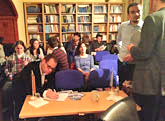 Belgrade, 28 February 2013
Belgrade, 28 February 2013
At the invitiation of the Konrad Adenauer Stiftung, the Tribunal’s Outreach representative in Serbia, Morgiana Brading, today gave a presentation on the work of the Tribunal to a group of around 30 young people from Belgrade, Kragujevac, Novi Sad and Novi Pazar, all of whom are active within either NGOs or political parties.
Following the presentation, much of the discussion focused on the differing perceptions of the Tribunal in the countries in the region. Some explained that they had recently visited Zagreb, Sarajevo and Potočari (the location of the Srebrenica genocide memorial), and had there had the opportunity to talk to young Bosnians and Croatians. They said that these had been revelatory experiences for them and that for the first time they had realised quite how different other people’s perspectives on the Balkan conflicts could be.
One said: “I have heard so much about Srebrenica and was quite angry about the blame that was being put on us [the Serbs]. Last year I went to Potočari to see it for myself and was shocked at what a powerful experience this was for me. The first time you lay eyes on the cemetery you stop in your tracks. And everything you thought you knew changes. Listening to politicians after this, trying to belittle this tragedy, leaves you speechless at how disrespectful they can be.”
Morgiana went on to explain that the ICTY only indicts individuals and not groups or states, thereby preventing blame from being placed on entire populations. The audience appreciated this, and also agreed with Morgiana that insisting on supporting the accused and expressing concern only for victims of their own ethnicity was not a good policy. “A victim is a victim, regardless of where they are from,” one participant said.
At the end of an intense discussion that lasted more than two hours, one of the young people said:
“The bottom line is that until Serbia does what Germany did and apologises properly, acknowledges the crimes, and maybe sets up a memorial like the one in Berlin to Holocaust victims, there will be no reconciliation in the region.”

